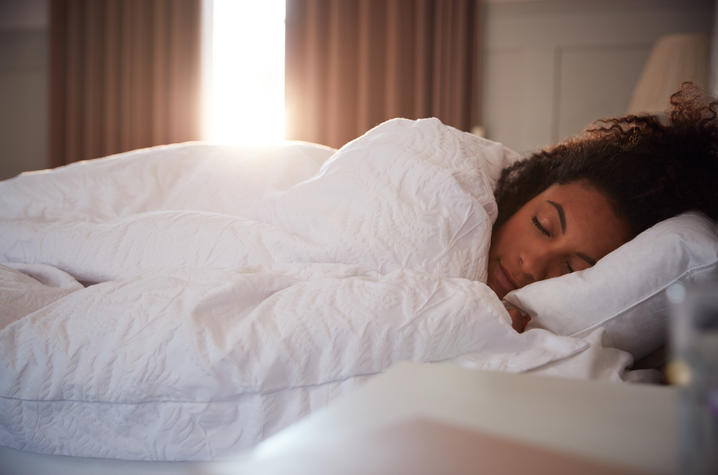Sleep and Daylight Saving Time: How to Maintain Restorative Sleep

The University of Kentucky Public Relations & Strategic Communications Office provides a weekly health column available for use and reprint by news media. This week's column is by Martha Rosenthal, a Sleep Medicine specialist in the University of Kentucky HealthCare's Division of Pulmonary, Critical Care and Sleep Medicine.
LEXINGTON, Ky. (Nov. 2, 2020) - How much sleep do you get each night? Quality sleep is essential to our health and many Americans do not get enough of it. The Centers for Disease Control and Prevention (CDC), as well as the National Sleep Foundation, suggests adults should average at least seven hours of sleep each night.
Our sleep schedule is regulated by our circadian rhythm - our body's natural biological clock that works on a 24-hour cycle. Biological clocks help regulate timing of processes and hormones in our body. In turn, our circadian rhythm greatly influences our overall health, as it affects our mental health, metabolism, weight, blood sugar, immune system and cholesterol.
There are a several factors that influence our rhythms, the most powerful of which is light exposure. This is why circadian rhythms are closely connected to day and night, and why Daylight Saving Time (DST) and the timing of exposure to light and darkness will have a significant effect on our normal sleep-wake cycles.
When we are exposed to light, our bodies will suppress the production of melatonin, which is a hormonal process that activates other hormones that affect our body's processes for sleep and wake drive. It has been suggested that a one-hour shift in the sleep schedule can affect sleep for the whole week after the change, though there is limited research on this topic.
What we do know is that when the body does not receive environmental cues that influence the body's internal clock, a person can struggle to fall asleep, stay asleep during the night and sometimes not reach the recommended seven hours of sleep each night.
The good news is that our bodies can adjust to the change, but it is important to know that it may take up to a week for your body to catch up on sleep. Here are some tips to help during the first week after the time change:
- Try to maintain a minimum of seven hours of sleep per night.
- Consider a brief nap in the afternoon for about a week after the time change.
- Exercise regularly and at the same time each day.
- Try going to bed and waking up at the same time.
Maintaining a healthy circadian rhythm is helped by maintaining a consistent wake and bedtime schedule with no change between weekdays and weekends. It's also important to soak up some sun for a daily dose of natural Vitamin D, exercise daily, avoid caffeine in the afternoon or close to bedtime and limit light exposure before bed, including exposure to artificial light from electronics like our phones and TVs. Naps during the day are okay, as long as you keep them short and not close to bedtime.
As the state’s flagship, land-grant institution, the University of Kentucky exists to advance the Commonwealth. We do that by preparing the next generation of leaders — placing students at the heart of everything we do — and transforming the lives of Kentuckians through education, research and creative work, service and health care. We pride ourselves on being a catalyst for breakthroughs and a force for healing, a place where ingenuity unfolds. It's all made possible by our people — visionaries, disruptors and pioneers — who make up 200 academic programs, a $476.5 million research and development enterprise and a world-class medical center, all on one campus.




